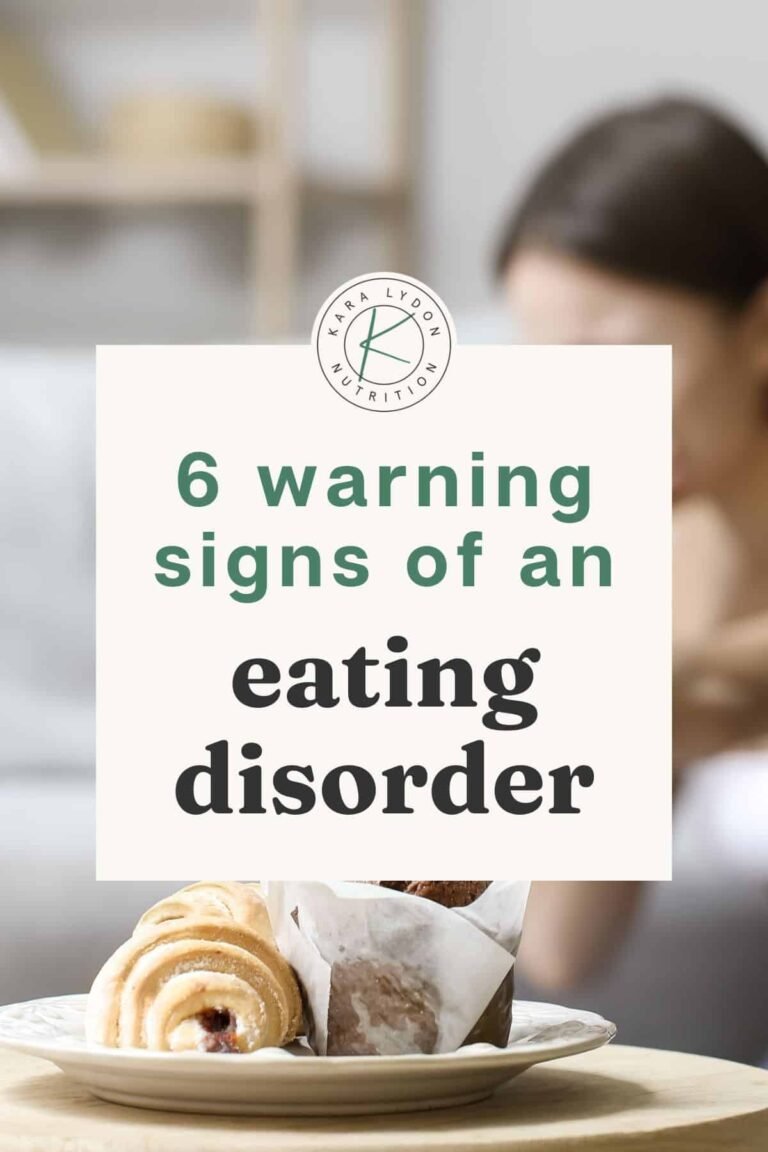Worried you might have an eating disorder but not sure? Read these 6 signs and symptoms of eating disorders to see if any resonate with you.
As a dietitian who specializes in treating eating disorders, all too often I see people miss the warning signs that their once-seemingly harmless eating behaviors are spiraling out of control.
In a culture that praises weight loss and dieting behaviors, it can be easy for eating disorder symptoms to fly under the radar, and unfortunately, they can sometimes even be praised for people with larger bodies. It can be hard to realize you’re struggling with an eating disorder when disordered eating behaviors have become so normalized in this health- and weight-obsessed culture.


While this post is for educational purposes only and is not intended to diagnose and is not a substitute for personalized medical, nutritional or mental health advice, I hope it gives you some information to help you find a provider who can offer you a diagnosis or more importantly, the care and support you deserve. You deserve to have a healthy relationship with food.
What is an eating disorder?
An eating disorder is a biopsychosocial disorder, meaning it is influenced by biology (genetics), personality traits (often co-occurring with other mental illnesses such as anxiety or PTSD), and sociocultural factors such as anti-fat bias. There are several types of eating disorders such as:
- Anorexia
- Bulimia nervosa
- Binge Eating Disorder
- Other specified eating disorder
- Avoidant/Restrictive Food Intake Disorder (ARFID)
- Rumination disorder
- Pica
- Orthorexia
Signs and symptoms of an eating disorder
1. You have a hobby with food
I always ask my clients to visualize a pie chart of all the thoughts they have during the day and then ask them if they were to shade in the section of their thoughts that includes food, weight and health, what percentage would they to shade?
While there is no exact limit here, it is encouraging to hear the response. My clients who say oh all consume or definitely the majority, 75% or higher, usually have an eating disorder or disordered eating.
If you find yourself obsessing over food choices and feel like you’re constantly thinking and stressing about food and don’t have the mental bandwidth for much else, you deserve more support.
2. The list of “safe foods” is getting shorter and shorter.
People with eating disorders often avoid many foods or a specific food group such as carbohydrates or fats, putting them at risk for nutritional deficiencies. Typically, if a “fear food” is consumed, they will feel significant distress and experience intense guilt or shame.
3. Your social life is negatively affected.
Do you avoid certain food situations or do they cause significant discomfort? People with eating disorders often find it difficult to eat out at restaurants and travel, and may miss social events or meeting friends that revolve around food.
4. You notice new physical symptoms.
You may notice one or more of the following symptoms: dramatic changes in weight, amenorrhea (or loss of menstrual cycle), feeling cold, growth of dandruff or fine hair on the body, dry skin, dizziness, weakness, fatigue, changes in blood pressure, gastrointestinal distress, hair loss and sleep problems.
This is by no means an exhaustive list, but these are some common physical symptoms to look out for. You may also want to read my blog post on signs of relapse.
5. You feel out of control around food.
My clients will often say that they feel like they can’t trust themselves around food and that they feel out of control about certain trigger foods. Once they start eating a certain food, they cannot stop and eat to the point of significant discomfort, sometimes not even being present for the experience.
They will then report feeling intense guilt or shame and may try to engage in a compensatory behavior such as purging, over-exercising, or restricting the next day. They may also eat in secret or hide or hoard food.
6. You obsess over your body shape and size.
People with eating disorders are often very dissatisfied with their body appearance and often engage in body checking behaviors such as spending time looking at their body in the mirror, weighing themselves, comparing their body to their own body, or pinching themselves. different areas of their body.


What to do if you suspect you have an eating disorder
If you suspect you may have an eating disorder or eating disorder, you deserve treatment, support and care. You don’t have to suffer alone.
See a registered dietitian, therapist, or PCP who specializes in treating eating disorders to see if you meet the criteria for an eating disorder. And even if you don’t (there are problems with the diagnostic criteria), you still deserve support if it’s negatively affecting your quality of life. Perfect.
Our private practice specializes in the treatment of eating disorders, and all of our registered dietitians are weight-conscious and trauma-informed. Learn more about nutritional counseling and book your nutrition assessment today.
For more eating disorder resources:
National Alliance on Eating Disorders
National Association of Anorexia Nervosa and Related Disorders
Association for Size Diversity and Health
National Association to Advance Fat Acceptance
For more blog posts like this, check out:
Am I Eating Enough? 8 Signs You’re Relapsing
What is the Hunger Fullness Scale?
The best body image books
I am hungry; Signs of hunger to watch out for
The science of diet and weight loss
